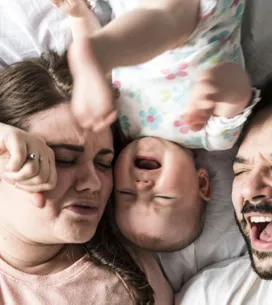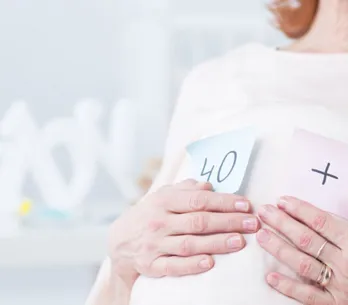Susie believes that if you're keeping healthy emotionally and physically then you have every chance of having a happy and healthy pregnancy after the age of 35.
"You can't control your fertility but you can control your food, you can control your health and you can control your stress levels so it’s about controlling the things that you can to help boost what you can't," she says.
So what are the risks of having a baby after 35 and how can you keep them to a minimum? We've looked into all this plus how to boost your chances of conceiving and how to keep you and your baby healthy throughout your pregnancy. So for all the advice on getting pregnant after 35 read on...
What can you do to increase your chances of conceiving?
A woman's fertility naturally decreases with age and so getting pregnant after 35 is not going to be as easy as if you were in your twenties, which is the natural peak of your fertility. However, even though chances of getting pregnant after 35 are going to decrease it does not necessarily mean that it won't happen or that you will even have trouble at all.
Susie says the main thing that prohibits women over the age of 35 from getting pregnant is the worry and stress of not being able to fall pregnant. The main thing to do before anything else is to let that go. Susie says: "With anyone over 35 their age can act as a mental and physical block when they are trying to get pregnant. They can feel like they've past the system and their own stresses and worries can reduce the chance of them conceiving.
"But more and more women are having perfectly healthy pregnancies at that age. The main thing they can do is emotionally prepare themselves before addressing any of the physical things."
The recipe for success is to: "Rest, relax and release," says Susie. Reducing the levels of stress in your life has a dramatic result on your chances of conceiving so this is the place to start.
Other things that you can do to help yourself conceive are to firstly see a health professional as soon as possible so that they can assess you. They can create a health record that will keep any information about your menstrual cycle, previous pregnancies and any health problems to make sure that you get the right help that you need as soon as you need.
Your doctor may refer you for certain tests, including a hormonal profile (also called a hormonal panel). This is a simple blood test taken the first to third day or your menstrual cycle to measure the levels of reproductive hormones, including FSH, oestrogen, and luteinizing hormone (LH) in your body. As well as this you can also have another test taken later on in your cycle, around the twenty first to the twenty eighth day to have your progesterone levels checked.
You should also be aware of when you are ovulating so that you can make the most of it. You can track your cycle on a calendar yourself or you can also invest in an ovulation predictor kit (OPK) to let you predict your most fertile days.
Seemingly simple, but incredibly important things like quitting smoking if you smoke or cutting out alcohol from your diet can dramatically improve your chance of conceiving. Keeping fit and healthy is also a great way to boost your chances of conceiving. Eat foods that will boost your endocrine system like things chock full of omega 3, essential fatty acids, zinc, magnesium, vitamin B6 and fruit and veg containing antioxidant vitamins C, E and beta carotene.
If you've been trying to have a baby for over 6 months and have not had any success then it might be time to see a fertility specialist so that they can work out the best way for you and your partner to move forward. It is also worth getting your partner's fertility checked out at this point - it's not just on you!
In Vitro Fertilisation (IVF) treatment can be an option for some couples, but the success rates with this treatment also decrease with age so it is worth really talking this through with your partner and the health professional.Paragraph
What can you do to make sure you have a healthy pregnancy?
If you are pregnant and are over 35, first of all - congratulations! There are many things that you can do to make sure your pregnancy is a healthy one.
Susie's advice is: "When you are pregnant continue what you started when you were trying to conceive because your body will need the same things to create your baby."
Talk to your Dr about medication:- Some forms of over the counter or prescribed medicines are not suitable for pregnant women so once you have got the confirmation that you are pregnant talk to your doctor about any medication that you take.
Go to regular Antenatal classes:- Because of the increased risks for pregnant women over the age of 35 it is incredibly important that you attend regular antenatal care. This means that doctors will be able to keep a close eye on you and if any problems do arise they will be able to treat you quickly. Meanwhile you can get the support and counselling and childcare education that you need.
Maintain a healthy diet:- Don’t eat food that isn’t pasteurised; eat fresh fruit lots of vegetables and drink lots of water, watch the mineral content of your cravings and where possible, try to go organic.
Exercise:- Susie wouldn't recommend taking on any new exercises when you're pregnant, so if you didn't run before pregnancy, this is not the time to start. Before you think about getting pregnant it might be worth starting yoga classes so that you have a form of exercise that you can do while pregnant.
Keep relaxed:- This can be harder said than done but a happy mother is usually a the key to a happy baby so take some time to really pamper yourself during your pregnancy. It's worth doing things like spending quality time with your partner, reflexology or anything that makes you relaxed and content.
Supplements:- Taking regular supplements are a really good way to keep your baby healthy and boost the levels of serotonin, zinc and folic acid in the body.
Stop smoking/drinking:- Like when you were trying to conceive, smoking is not an option if you want a healthy pregnancy. While some women like to have the occasional alcoholic drink during pregnancy they are strongly advised not to, especially in the first 3 months as this can greatly increase the chances of miscarriage.
After that women can drink 1-2 units every one or two weeks if they would like, it is uncertain what effects this might have on your baby so it is strongly unadvised to do so.
What are the risks associated with getting pregnant after 35?
There is no denying that having a baby after 35 years of age increases the risks from conception to birth as your natural egg reserve has already started to diminish but this does not mean that you will definitely encounter these problems.
The chance of miscarriage increases dramatically over the age of 35 and so in the first trimester of pregnancy it is very important that you see your health advisor regularly so they can help in any way to reduce the risk.
As well as this there is an increased chance that if you do become pregnant, your baby could be born with a genetic abnormality, most notably Downs Syndrome, the number of cases is approximately 1 in 300 in pregnancies of women over 35. There are tests that will show if your baby has any genetic abnormalities at 10-12 weeks if you wish to take it and there are various options available including counselling to couples if this test shows anything.
There is also an increased risk for pregnant women over the age of 35 to develop high-blood pressure or diabetes which can be a big problem for your baby. There is also an increased risk of eptopic pregnancies as well as placenta previa (where the placenta lies low in the uterus, partially or completely covering the cervix), preeclampsia and placenta abruption (where the placenta separates from the uterine wall).
This all sounds scary but the more that you look after yourself, the bigger the chance that your pregnancy will be as normal and healthy a pregnancy as someone in their twenties. So remember a healthy, happy you means a healthy, happy baby.
For more advice on pregnancy over the age of 35 consult your doctor.
Liked this? You might also like:
Pregnant Kate Middleton Forced To Miss Prince George's First Day Of School
25 Things You Should Never Say To A Pregnant Woman
What Actually Works? 10 Of The Best Creams & Oils To Prevent Stretch Marks













